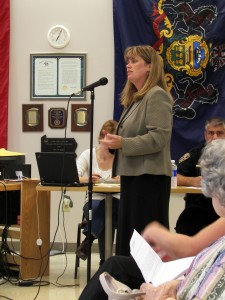DUBOIS – As of December 31, 2010 residents will see an increase in their. Brenda Fargo, a Government Aggregation Program Manager from FirstEnergy Solutions in Akron, Ohio, presented the DuBois City Council with a possible solution to save residents some money when the cap is lifted. 
Fargo told the council that she wanted to talk to them about municipal aggregation and how it relates to the increase that residents will see in January. She explained that there are currently auctions taking place which will determine the rates going forward from January. Fargo said that the rates are projected to increase between 17 to 20 percent for the generation portion of the bill. She said that the generation portion is about 50 percent of the bill.
Fargo explained to council that because DuBois is a “home rule” city, meaning they adopted a charted that enables them to make decisions without going to state legislation within the laws of the state, they are able to do more than some of the other surrounding municipalities. She explained that municipal aggregation has been in effect in Ohio for the past ten years and has been very successful in saving residents money.
“We believe it can be successful for folks here,” Fargo said.
Fargo proposed that DuBois move forward into the municipal aggregation program. She explained that it is an “opt out” program, meaning that all the residents are in the program unless they choose to opt out. The program would require an 18-month commitment from the residents who do not opt out.
Other communities that are in talks with FirstEnergy Solutions are Edinboro, Erie, Sharon, among others.
Fargo explained that there is currently legislation in the house that would allow for all communities in Pennsylvania to participate in municipal aggregation. There will be a public hearing in Johnstown next week. Fargo said that if the legislation might not be passed this year due to the Senate announcing they will not be in session after November.
Residents who participate in the program would receive a six percent discount on their energy bill. Fargo explained that with the increase going up 20 percent, those who participate would actually only see a 14 percent increase.
Council member Jim Aughenbaugh asked Fargo how much under the current rates were under the market value. Fargo said that she could not answer that. She did say FirstEnergy Solutions could not beat that rate but tries to make up for it with the six percent discount.
Solicitor Toni Cherry sought to understand the process by which FirstEnergy Solutions operates and asked Fargo if their company purchases “quantities of energy and then resells it to communities with the goal of providing it at a lower rate than Penelec has been authorized to sell it.”
Fargo explained that FirstEnergy Solutions is a subsidiary of FirstEnergy. She said they “essentially cut out the middle man.” She explained that nothing changes from Penelec. Residents will still get a bill from Penelec but it will state that their energy is being provided by which ever company is providing the energy. She said that because of the rate caps, which no other company could beat, and the fact that they are coming off in January, people are now able to “shop around” for a cheaper energy source.
If the council moves forward with the program, residents would receive a letter from FirstEnergy Solutions. They would then have 30 days to decide whether or not they wished to participate or opt out. If they want to get out of the program they send a notification. Those who do not opt out will have their information sent to Penelec stating they are participating in the program. By law, Penelec has to send a letter to the residents, telling them they have 10 days to decide whether they wish to participate in the program.
Fargo said that residents in Ohio have been very happy with the program.


